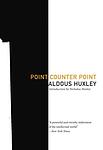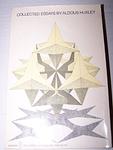Aldous Huxley
Aldous Huxley was an English writer and philosopher. He was born on July 26, 1894, and died on November 22, 1963. Huxley is best known for his novel 'Brave New World,' a dystopian vision of the future. He was also known for his wide-ranging output, which included essays, travel writing, poetry, and screenplays, as well as books on spirituality, arts, and sociology. His works are notable for their wit, intellectual curiosity, and insights into the human condition.
Books
This list of books are ONLY the books that have been ranked on the lists that are aggregated on this site. This is not a comprehensive list of all books by this author.
-
1. Brave New World
Set in a dystopian future, the novel explores a society where human beings are genetically bred and pharmaceutically conditioned to serve in a ruling order. The society is divided into five castes, each with its specific roles. The narrative follows a savage who rejects the norms of this new world order and struggles to navigate the clash between the values of his upbringing and the reality of this technologically advanced, emotionless society. His resistance prompts a deep examination of the nature of freedom, individuality, and happiness.
-
2. Crome Yellow
"Crome Yellow" is a satirical novel set in an English country house, where a diverse group of guests gather for a summer holiday. The narrative explores various themes such as love, art, religion, and education through the conversations and interactions of the characters. The novel is known for its witty dialogue, social commentary, and for being an early example of the author's social criticism.
-
3. Point Counter Point
"Point Counter Point" is a satirical novel that explores the dilemmas of a group of intellectuals living in 1920s London. The narrative delves into their personal lives, affairs, and philosophical debates, presenting a vivid portrait of post-World War I society. The characters' diverse viewpoints on science, art, religion, and politics reflect the cultural and ideological conflicts of the time, with the author skillfully interweaving their stories to create a complex, multi-layered narrative. The novel is notable for its experimental structure, which mirrors the form of a musical counterpoint, with multiple plot lines unfolding simultaneously.
-
4. Eyeless in Gaza
This novel follows the life of Anthony Beavis, a British intellectual, from his childhood to his mid-thirties in the 1930s. As he navigates through life, he deals with the death of his mother, the suicide of his best friend, and his own philosophical and spiritual explorations. The narrative jumps back and forth in time, reflecting Beavis's memories and current experiences. The novel explores themes of pacifism, spirituality, and personal growth, culminating in Beavis's transformation into a pacifist following a spiritual awakening.
-
5. Collected essays
This collection of essays explores a wide range of topics, from art and democracy to faith and morality. The author draws on his vast knowledge of literature, philosophy, and science to delve deep into each subject, offering insightful commentary and observations. His writing style is both eloquent and accessible, making complex ideas understandable to the general reader. These essays serve as a reflection of the author's worldview and his deep intellectual curiosity.
-
6. The Doors Of Perception
In this philosophical and introspective work, the author details his experiences after ingesting a dose of mescaline, a psychedelic substance derived from the peyote cactus. He vividly describes the profound alterations in perception and consciousness he undergoes, exploring the nature of the mind and the way it filters reality. The narrative delves into the concept that the human brain constrains awareness to ensure survival, but that such substances can temporarily remove these filters, allowing access to a more direct and unmediated experience of the world. The author draws on art, religion, and philosophy to contextualize his insights, proposing that these altered states of consciousness have the potential to provide deep spiritual and intellectual enlightenment.
-
7. Antic Hay
Set in the disillusioned post-World War I era in London, the novel is a satirical portrayal of the aimless lives of a group of hedonistic intellectuals. The story follows a disillusioned schoolteacher who, seeking meaning and excitement, becomes entangled with an eccentric group of characters, including an artist, a scientist working on a bizarre invention, and a seductive femme fatale. Through a series of comedic and ironic encounters, the narrative delves into themes of despair, the search for purpose, and the absurdity of modern life, all while painting a vivid picture of the Roaring Twenties' cultural and social milieu.
-
8. After Many A Summer Dies The Swan
"After Many A Summer Dies The Swan" is a thought-provoking novel that follows the life of an eccentric millionaire, Jo Stoyte, who becomes obsessed with the possibility of immortality. In his quest for eternal life, Stoyte surrounds himself with a group of intellectuals and scientists, and together they embark on a journey filled with philosophical discussions, scientific experiments, and dark secrets. As the story unfolds, the characters grapple with the moral implications of their actions and confront the inevitable nature of death, ultimately leading to a profound exploration of the meaning of life and the human condition.







